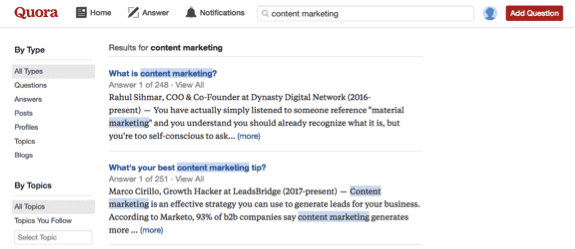We know we don’t need to tell you how important it is to invest in content marketing for the sake of your business. (After all, you’re already on our blog.) It helps to legitimize your offerings to potential clients, boost your SEO, and frame yourself as a thought leader in your industry.
And, since you’ve chosen to read this piece specifically, chances are that you’ve already started developing content for your company or personal brand. The problem? You might now find yourself getting a little stumped when it comes to topic ideas.
Hey, we’ve all been there. More than we’d like to admit even! The blog burnout is real.
It’s not just about thinking of things to write about (we know there is plenty of information in that professional brain of yours just itching to get out), but it’s also an added challenge to make content stick out in a saturated market.
According to Statista, there will be 31.7 million bloggers by the year 2020. That is an overwhelmingly intimidating number of people fighting to be an influencing voice in their niche.
So, how can you stand out while staying authentic to your brand? Below we’ve outlined a number of tips and exercises to help you get out of your rut and make sure your content stays fresh, enlightening, and original.
Value Daily Inspiration
This may sound a little too simple, but the truth is that you are doing, thinking, and talking about multiple things during a regular workday that could breed some great content.
Come across an obstacle with a client or partner? Solve a problem that’s been nagging you? Celebrating a small victory with your team? If you are experiencing these issues, breakthroughs, and milestones, it’s likely that other people in your position are as well. All of these happenings can morph themselves into content that resonates with others.

To stay on top of these daily flickers of ideas, keep a running list of potential topics—even if they feel partial or insignificant at the time. You can use the Notes application on your iPhone, or kick it old school and place a pad of paper and pen on your desk to scribble on throughout the day.
Whatever you do, DON’T assume that you will remember something at a later time. You have too many other things going on, so do yourself a favor and write (or type) it down.
Open Your Ears (and Mouth!)
Ask people! Whether you’re networking at an industry event or chatting with parents at your kid’s tee-ball game this weekend, get a sense of what types of questions others have when it comes to your business.
The same goes for your co-workers. We suggest engaging your team in brainstorming sessions regularly. Though they may be involved in the same meetings, calls, and projects as you on a daily basis, they most likely have a different take on some subjects and could give you an alternative angle to consider. Tapping into the informed recourses right across the table from you can spark some great discussions.
Get Online
There are a lot of different resources to leverage for inspiration on the good ol’ World Wide Web. Here are a few to consider:
- Discussion Boards: What do people do when they have a question? They usually go to Google where their inquiries are met with not just websites and news articles, but online communities of people seeking similar answers across all different kinds of topics. Visit reddit or Quora, type in your industry or an applicable keyword, and check out the kinds of questions being asked.

Source: www.quora.com
- Other Blogs: This may seem obvious, but some fear that by reading other industry blogs they run the risk of feeling like they are piggybacking off of someone else’s content. Don’t fret! It’s good to check out what your peers, competition, and customers are talking (and writing) about so you can bring your own personal spin to the issue.
- Podcasts: In a similar vein to blogs, listening to podcasts is a convenient and time-effective way to do some market exploration or get educated on a certain topic. Do a little research to see what people or companies you admire have podcasts, and then plug in while you drive to the office, handle some admin work, or wash the dishes. Thinking about your content shouldn’t be limited to 9-5.
- Your Blogs: We recommend you avoid depending solely on other industry blogs for inspiration, and consider your own past content as well. You may be asking: “Huh? We’re trying not to be repetitive!” Hear us out. Maybe you wrote a previous trends piece, or talked about advances in technology. Your industry is continuously evolving, so don’t be afraid to go back and update old content to make it new again.
Plan Ahead
Believe it or not, having a strategic plan can actually promote creativity as opposed to stifling it. Being mindful of things happening in your industry throughout the year—maybe your customers experience a greater need for you in Q1, or there is a huge annual event in September—can help trigger content ideas.
Having a plan also ensures that your content approach is thoughtful and consistent. You can even enlist the help of tools like Ops Calendar to take the guesswork out of content marketing and streamline your content across all channels. This allows your team to properly support launches or campaigns while assuring that your digital assets—your website, blog, social media accounts, emails, etc.—stay in sync.
One thing to keep in mind: While having a plan makes content marketing more effective and less burdening, it’s critical that you leave room for flexibility. Current events, industry news, and developments in technology can quickly shift the industry landscape or initiate conversations among your audiences. You always need to be ready to strike while the (content) iron is hot!
Of course, we understand that you’re a busy person with a thousand other decisions and tasks that you have ownership over each day. Outsourcing to reputable content marketers (such as Audience Ops) can take the planning, drafting, and deploying of your content off of your crowded plate.
Learn a Little
You may feel inclined to only write about topics you feel you are an expert in. Though that’s understandable, and you should certainly flex your knowledge muscles a bit, there is something to be said for learning something new.
Some of the best content comes from the content creator asking a question they truly have, and then going through the process of uncovering the answer. This gives your audience the opportunity to feel like a part of the experience—from frustration or confusion, through research, and into discovery. It draws an organic line between the writer and the reader, allowing you to become a trusted partner on the issue.
[Tweet “Some of the best content comes from the content creator asking a question they truly have.”]
This also tends to create more dynamic content—the audience can sense your interest and energy, instead of feeling like you are just regurgitating information you could relay to them in your sleep.
Regularly following this method will ensure that your content remains fresh and engaging. Plus, you’re expanding your mind! Win-win.
The Bottom Line
It’s totally normal to run into content roadblocks, but developing daily habits will help alleviate the pressure to think on the spot and allow you to build a catalog of potential topic ideas.
Understanding that quality—not quantity—of content can help with your SEO (search engines like Google favor pages and sites that are sharing valuable content) and do wonders for your reputation will force you to put your brain power behind subject matter you actually enjoy. This will make your audience enjoy it, too.